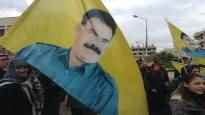The Kurdistan Workers’ Party (PKK) has become a major European topic of discussion regarding Finland’s and Sweden’s NATO membership. What kind of organization is it?
Turkey has demanded that Finland and Sweden suspend all support for the PKK. What exactly this means is a bit unclear.
The conflict between the PKK and Turkey has lasted for decades. The current clash began in mid-August 1984 when PKK guerrillas struck a police station in remote Eruh in southeastern Turkey.
On the same day, an officer club and a small barracks were shot to shreds in Şemdinl, near the borders with Iraq and Iran.
The attacks were barely noted in western Turkey, and the then prime minister Turgut Özal estimates that a small group of robbers made the attacks. However, a storm was brewing in the Kurdish region, which would shake Turkey thoroughly.
Born in the radical left in Turkey, the PKK began its activities as early as 1978, but the 1980 military coup and crackdown on all armed groups also forced the PKK to suspend its activities.
From mountain Turks to Kurds
The military junta that seized power in 1980 revived the old Turkish nationalist idea that the Kurds do not exist, they are just stray mountain Turks.
The PKK not only sought recognition of the existence of the Kurds, but long sought to establish an independent Kurdish state.
Turkey is estimated to have just under 20 million Kurds, or more than a fifth of the population. However, there are no exact figures. There are also significant Kurdish minorities in Iraq, Iran and Syria.
The small attacks on remote targets in Turkey that began in 1984 escalated into a war that killed an estimated 40,000 people – soldiers, guerrillas and civilians. The attacks targeted military targets, but also in the 1990s for example, for teachers (moving to another service)and some other government officials.
In support of the security forces, the Turkish government set up a village guard system and armed the villagers against the PKK.
Security forces usually set fire to the village if the villagers refused to cooperate. Those who took the state’s weapons, in turn, were targeted by the PKK, and sometimes not only the village guards but also other villagers were killed in the attacks.
Father Assad abandoned the PKK and Öcalan ended up in prison
The fighting began to abate in the late 1990s and Turkey managed to abduct a PKK leader who had been on the run. Abdullah Öcalanin in the year 1999.
Öcalan had been the dictator of Syria Hafez al-Assadin under protection, but Turkey forced al-Assad to relinquish its protection by threatening war. Syria tried to take advantage of the PKK to put pressure on Turkey in a dispute between the two countries over the regulation of the river Euphrates from Turkey to Syria.
Öcalan was sentenced to life imprisonment and transit to a prison island near Istanbul, where he remains.
PKK weakened in Turkey
The PKK did not collapse to arrest its leader, but the organization has weakened. The guerrillas have retreated for the most part outside Turkey’s borders, especially in the mountains of northern Iraq, where Turkey is constantly attacking.
The Syrian Kurdish regime also has close relations with the PKK. Turkey considers the PKK and the Kurdish regime in northern Syria to be one and the same terrorist organization.
The PKK’s goals have changed over the years. Now the PKK says it is seeking Kurdish self-government and grassroots democracy.
For many Kurds, linguistic rights, such as the right to education in their mother tongue, are important. In this matter, Turkey has sometimes taken steps forward, sometimes backwards. Kurdia can study (you move to another service)as an optional subject in some schools for a few hours a week.
The Erdoğan administration also negotiated with the PKK
Although the President of Turkey Recep Tayyip Erdoğan speaks loudly about terrorism, his own administration has held secretive talks with a PKK leader isolated on a prison island.
The PKK’s current leadership resides in northern Iraq, but Öcalan communicated at one point with the Turkish government, apparently through the country’s intelligence service.
However, negotiations collapsed and in 2015 there was a bitter war in the cities of the Kurdish region of south-eastern Turkey.
The PKK is now far behind Turkey’s borders. It would also be important for Turkey to crush all the organizations in Europe that are interpreted as support structures for the PKK.
The European Union and the United States also define the PKK as a terrorist organization, but Kurdish organizations in Syria are not on these lists.
In Modern History of the Kurds, David McDowall
Blood and Belief, Aliza Marcus
Turkey – Europe and Asia, Tom Kankkonen
